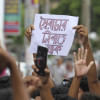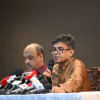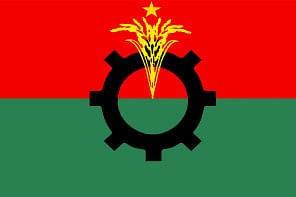Dhaka asks Delhi to send back Hasina
The foreign ministry has sent a diplomatic note to the Indian government, saying that Dhaka wants ousted prime minister Sheikh Hasina sent back.
"We sent a note verbale [diplomatic message] to the Indian government, saying that the Bangladesh government wants her [Hasina] back here for the judicial process," Foreign Adviser Touhid Hossain told reporters at the foreign ministry yesterday afternoon.
Earlier in the morning, Home Adviser Jahangir Alam said his ministry had written to the Bangladesh foreign ministry, asking it to facilitate the return of Hasina from India.
"We have sent a letter to the foreign ministry regarding her extradition. The process is currently underway," he told reporters at an event at the Border Guard Bangladesh headquarters in Dhaka's Pilkhana.
On how she would be returned, Jahangir said it would be done under a prisoner-exchange agreement with India.
The Indian media in the evening reported that the country's Ministry of External Affairs received a note verbale from Bangladesh in connection with the extradition request for Hasina.
The ministry, however, refrained from commenting on the matter yesterday.
"We confirm that we have received a note verbale from the Bangladesh High Commission today in connection with an extradition request. At this time, we have no comment to offer on this matter," India Today quoted Ministry of External Affairs Spokesperson Randhir Jaiswal as saying at a press briefing.
Hasina stands accused in over a hundred cases and is facing a multitude of charges, including murder, genocide and crimes against humanity over the killings during the July uprising that resulted in her ouster on August 5.
India and Bangladesh signed a treaty in 2013 regarding extradition. The treaty was amended in 2016.
The treaty states, "Extradition may be refused if the offence for which it is requested is an offence of a political character." Another ground for refusal of extradition is if the charges being pressed have not been "made in good faith, in the interest of justice".
It, however, says certain offences, like murder, "shall not be regarded as offences of a political character" for the purposes of the treaty.
The relations between India and Bangladesh came under strain since the interim government headed by Nobel laureate Muhammad Yunus assumed power following Hasina's ouster and flight to Delhi.
India has repeatedly expressed concerns over attacks on minorities, especially Hindus, in Bangladesh.
Meanwhile, Dhaka dismissed Indian media reports on the attacks as "exaggerated".
Earlier, on October 17, a three-member International Crimes Tribunal bench led by its Chairman Justice Md Golam Mortuza Mazumdar issued arrest warrants for 46 people, including Hasina and former minister Obaidul Quader, in separate cases.
ICT Chief Prosecutor Md Tajul Islam had earlier said they would seek to bring back Hasina in time to stand trial.

 For all latest news, follow The Daily Star's Google News channel.
For all latest news, follow The Daily Star's Google News channel. 









Comments